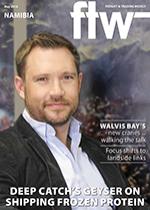Established in 2007 as a twoperson fish exporter, Windhoekbased Deep Catch Trading has mastered the challenge of moving hundreds of tons of frozen fish, poultry and meat safely over thousands of kilometres in subtropical heat.
The company is the founding business of the Namibian-based Deep Catch Group, which has multiple business units vertically integrated in imports, cold storage, shipping and forwarding, and foodservice distribution. With facilities in Cape Town, Harare, Lusaka and Livingstone, the company transports mainly fish and poultry products by road from Walvis Bay to destinations such as Lubumbashi, Lusaka, Kitwe, Harare and Maputo.
“Arranging cross-border deliveries can be challenging since not all countries comply with the same set of regulations,” says Stefne Lintfelt, managing director of the Camel Thorn Freight Forwarding subsidiary in Walvis Bay “Certain requirements which are enforced in some countries are not acceptable to others. For example, the operators of our weighbridges in Namibia allow 5% grace. This is not accepted in Zambia. “In addition, not all weighbridges are calibrated the same, which can mean the same load will show different weights on different scales,” says Lintfelt.
Exporters also have to keep track of economic and political developments in the countries to which they supply products. “A shortage of liquidity in some SADC countries affects payments and cashflow, and also results in fluctuations in supply and demand. You also have to factor in foreign exchange rate volatility,” she says.
“Camel Thorn Freight Forwarding manages the full logistics chain for Deep Catch from shipment at origin countries (Asia, Europe, America, South America) to delivery in Namibia, and re-exportation to other countries in SADC and elsewhere using its own road bond where required,” says Jared Dwight Geyser, Deep Catch Group marketing director.
“The process includes managing the storage of containers, booking and management of transporters, cross packing into utility trucks where required, and management of BIVAC (Bureau Inspection Valuation Assessment Control) inspections on our behalf destined for DRC.” Loads have to be kept frozen on the road for up to 14 days.
“Product is imported and/or delivered by local producers to the group’s Atlantic Commercial Cold Store in Walvis Bay. It is then transferred to third-party contracted refrigerated trucks for transport to customers’ premises in the SADC destinations,” says Geyser.
Temperature data loggers are fitted to all the refrigerated trucks to ensure that the food has been kept at the minimum temperature. Deepcatch is the largest importer of poultry in Namibia and all movement and handling of the frozen poultry and meat into Namibia is controlled and monitored by the Department of Veterinary Services, he says.
“Compliance with State Veterinarian bureaucracy can be costly and time-consuming, but this is overcome by patience and co-operation with the state veterinarians,” says Geyser. Based on the success of its exports into SADC and other southern African countries, the company is looking at new markets.
INSERT AND CAPTION
Arranging cross-border deliveries can be challenging since not all countries comply with the same set of regulations. – Stefne Lintfelt
CAPTION
A truck leaving the Deep Catch premises in Walvis Bay

